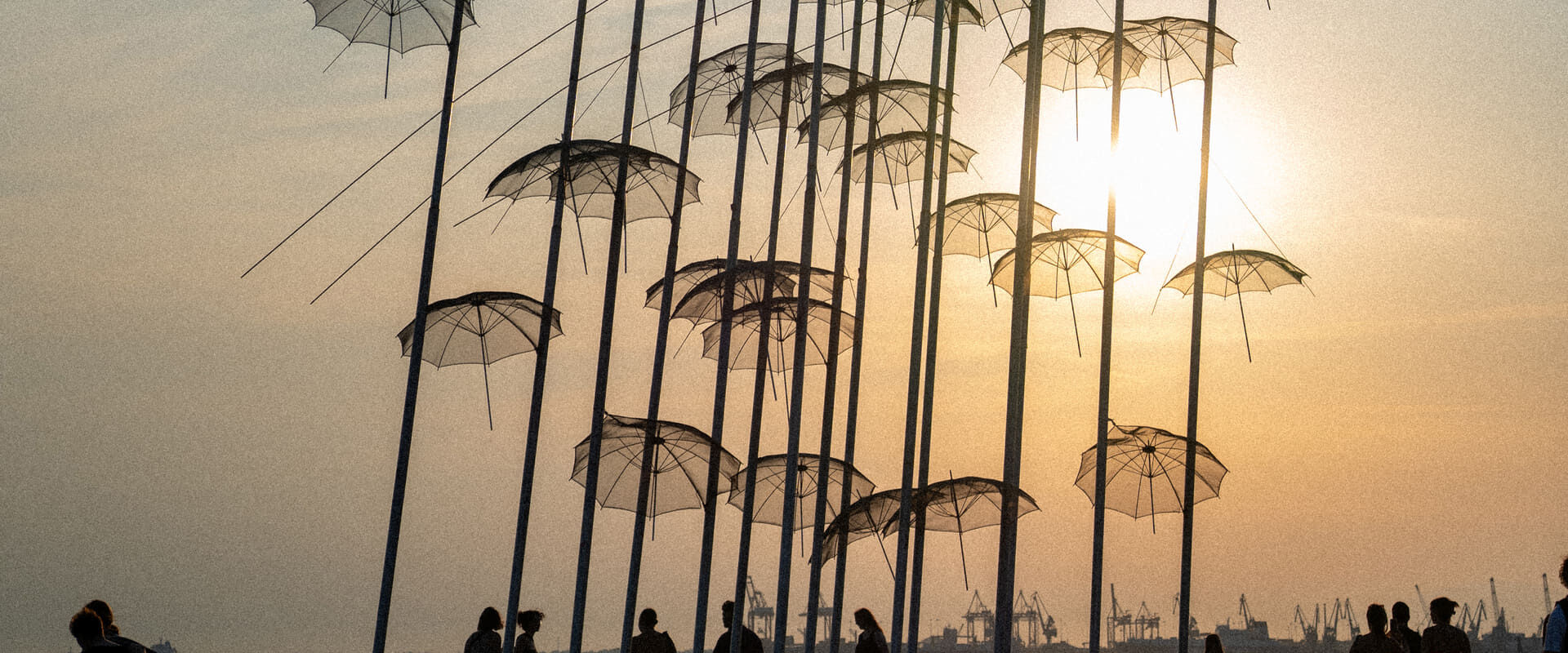
Thessaloniki Travelers Practical Information
All the information you need to help you plan your trip to Thessaloniki and get around smoothly.General Travel Tips
Thessaloniki, Greece’s second-largest city, is ideally visited in spring (April to June) and fall (September to November). These seasons offer mild weather, making it comfortable for sightseeing without the summer crowds. Summers can be hot and busy, while winters are mild but can be rainy. Thessaloniki has a rich cultural history, and knowing basic Greek phrases like "kalimera" (good morning) and "efcharisto" (thank you) can enhance interactions with locals. The city uses the Euro (€), and currency exchange services are available at airports, banks, and major hotels. ATMs are widespread, but it’s advisable to carry some cash for small purchases, especially in markets and smaller establishments.
Accommodation Options
Thessaloniki offers diverse accommodation options catering to various budgets. In the heart of the city, around Aristotelous Square, you’ll find luxurious hotels like Electra Palace and The Met Hotel, which offer high-end amenities and stunning views of the square and the sea. These hotels often provide rooftop bars and pools, making them ideal for enjoying the city's vibrant atmosphere. For mid-range travelers, there are excellent boutique hotels such as The Modernist, which combine comfort with unique design elements.
Budget travelers can find affordable and comfortable accommodations like Capsis Hotel Thessaloniki near the railway station. These areas offer a range of hostels and budget hotels that provide essential amenities and easy access to public transport. For those seeking a quieter stay, the coastal areas such as Thermi and Agia Triada offer hotels with large swimming pools and beautiful sea views.
For additional information and to book your stay, click here.
Local Transportation
Thessaloniki’s public transportation system is efficient and easy to use, primarily consisting of buses and taxis. Bus services from the airport to the city center run frequently, taking around 30-45 minutes. The No. 78 bus connects the airport to the central bus station and the main train station, providing a convenient link for travelers.
Bus
The buses are the fastest and most reliable way to travel, connecting major areas and attractions. Bus tickets can be purchased from O.A.S.TH. ticket offices, or issued from the ticket machines inside the buses. Pre-printed tickets must be validated at the bus's validation machines immediately upon boarding. Note that the ticket machines do not give change, so be sure to have the exact fare ready.
The Cultural Route No 50 offers a route through Thessaloniki's history, with stops at numerous historical monuments that reflect its long history from ancient, Hellenistic, Roman, and Byzantine times to the present.
Bus tickets costs:
- €0.90 for a one-way ride
- €1.10 for a 2 buses within 70 minutes ride
- €1.30 for a 3 buses within 90 minutes ride
- €1.80 for a 4 buses within 100 minutes ride
- €1.80 for the Cultural Line (50)
Taxis & Car rentals
Taxis are readily available but ensure the meter is running to avoid overcharging. Daytime fares should display "1" on the meter, while "2" indicates double rates for nighttime services from midnight to 6 a.m. Car rentals are available for those looking to explore beyond the city, but be mindful of traffic and parking challenges in the city center.
Bike
The New Waterfront of Thessaloniki is ideal for a bike ride, providing a scenic and enjoyable experience.
Food and Dining
Thessaloniki is a culinary hotspot, renowned for its diverse and flavorful cuisine. The city’s food scene blends traditional Greek dishes with influences from its rich multicultural past. Key dishes to try include bougatsa, a pastry filled with sweet custard or savory fillings like cheese and minced meat, and gyro, a popular street food consisting of meat cooked on a vertical rotisserie, typically served in pita bread with various toppings.
The Ladadika district is famous for its lively nightlife and abundance of restaurants and tavernas. Here, you can enjoy meze, small dishes served to accompany drinks, which often include local specialties like tzatziki, dolmades, and grilled octopus. For fresh produce, olives, spices, and more, visit the Modiano and Kapani markets, where you can also find small eateries serving traditional Greek fare.
Don’t miss the chance to enjoy coffee and desserts at one of the many cafes around Aristotelous Square, where you can savor traditional Greek coffee and pastries like baklava and galaktoboureko.
Thessaloniki also hosts several food festivals throughout the year, celebrating its culinary heritage and offering visitors a chance to taste a wide variety of local dishes.
For a more immersive experience, various food tours are available, guiding visitors through the best eateries and hidden gems of the city. These tours often include tasting sessions of local wines and olive oils, providing a comprehensive culinary experience.
Safety and Health
Thessaloniki is generally a safe city for travelers, but it's always prudent to stay vigilant, especially in crowded areas and on public transport. Pickpocketing can occur, so keep your belongings secure and avoid displaying valuables. The city’s emergency number for all services, including medical emergencies, is 112. In addition, specific numbers for police (100), fire brigade (199), and emergency medical services (166) are also available.
Healthcare facilities in Thessaloniki are excellent, with several hospitals and clinics offering comprehensive medical services. Pharmacies are widespread and can provide over-the-counter medications as well as prescription drugs. It’s advisable to carry any essential medications and a basic first aid kit. Tap water is safe to drink, and the city's food safety standards are high, making it safe to enjoy the local cuisine.